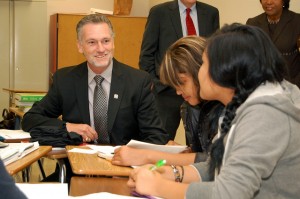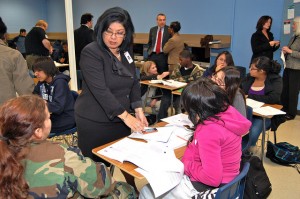“Write down the line number where you’re finding your evidence,” Professor Garcia advises her students as they work on essays.
It’s typical English 1301 – with atypical college students: they aren’t out of high school yet. Professor Garcia’s class is offered at Austin’s LBJ Early College High School, one of two Austin ISD schools offering the pilot program. The partnership between ACC and AISD enables students to earn up to two years of tuition-free college credit that also fulfills high school requirements. That will give incoming students a chance to achieve an associate degree by high school graduation.
Dimitri Turnipseed is among Professor Garcia’s LBJ students; he’s also currently taking ACC’s U.S. Government (GOVT 2305).
“The professors are nice but not too nice,” Turnipseed says. “When something is due, it’s due. They don’t give you any extensions like they do in high school. It makes you a better student. It makes you more responsible.”
Turnipseed is one of more than 450 Austin high school students enrolled in the Early College High School (ECHS) programs at LBJ and Reagan. ECHS offers students a unique opportunity. Unlike ACC’s Early College Start program, which allows high school juniors and seniors to take certain ACC courses to earn dual credit, ECHS is available to LBJ and Reagan students beginning in the ninth grade. In addition, ECHS targets a broader range of academic backgrounds than dual credit or Advanced Placement programs – opening up higher education to students who might not otherwise have considered it.
“Higher education is not a mystery to them anymore,” explains Dr. Richard Rhodes, ACC president/CEO. “They see clear pathways made available to them.”Â
Dr. Rhodes recently toured LBJ and Reagan, taking a first-hand look at the programs as they get off the ground this semester.
“The best part is meeting the students and getting to hear their dreams and their goals,” says Dr. Rhodes. “I see how committed they are to their future. They understand what this is all about.”
ACC’s ECHS is the first of its kind in this area. It is part of a growing movement – with 230 such programs nationwide – to increase the number of first-generation college students. The program is funded through the Gates Foundation and AISD; additional funds for Reagan are provided by the Texas Education Agency’s Texas Title 1 Priorities Schools Grant.
ECHS is open to all Reagan and LBJ students who meet Texas Success Initiative (TSI) college-readiness criteria. Eligible students take courses in English, Government, History, Speech, Psychology, Sociology, and Spanish. Those who don’t meet TSI standards enroll in a Human Development course called Transition to College Success, which gives them one credit hour.
Raymond Gerson, an adjunct professor of human development who teaches Transition to College Success at Reagan, believes ECHS will be effective. During this fall’s first eight-week session, almost 90 percent of students enrolled in the Transition class completed the course.
“I’m seeing students who are very much at risk doing some good work in my class,” Gerson says. “It’s exciting to be part of a new venture, on the cutting edge. It’s an incredible opportunity for these kids.”
Families and students are recognizing that opportunity. This fall, more than 250 students transferred into Reagan, which was once considered for closing.
Dr. Rhodes, who oversaw the implementation of several Early College High Schools during his tenure as president of El Paso Community College, acknowledges some people think students as young as 14 aren’t ready for college.
“I’ve seen it, and I know it can happen,” he counters. “I know their capacity and abilities. While it may not be for every single student, we have so many students in our population who are ready for that challenge. It’s up to us to make sure we provide those opportunities and pathways.”
AISD concurs, believing promoting college-readiness to younger students will translate to higher graduation rates and more students enrolling in higher education.
“It’s no longer about college-ready. It’s college-now,” says Edmund Oropez, AISD’s associate superintendent for high schools. “High schools are not getting them ready for college. They’re ready now and in college. Middle schools have the focus on college-readiness.”
ECHS students must meet the same class requirements and are graded on the same standard as other college students.
“We’re not going to waver from the expectations and the rigor, but we will give them the support and the incentives to be successful,” says Dr. Rhodes.
Dr. Rhodes hopes to eventually bring Early College High School opportunities to students in all districts in ACC’s service area.
“ECHS is a key element to building a strong college-going culture and closing education gaps,” notes Dr. Rhodes.
That’s certainly what ECHS is doing for Dimitri Turnipseed, the LBJ senior. He is the first in his family to go to college and plans to continue his education at Texas State University or the University of Texas at San Antonio. Turnipseed says the challenges of ECHS are preparing him for the next step in his life.
“It made college more real to me,” he says. “You hear about college, but now I see it for myself.”
View more photos from Dr. Rhodes’ ECHS visit on ACC’s Flickr page.






By Karen January 10, 2012 - 8:40 am
Will this program be made available to RRISD schools?
By mreyes January 10, 2012 - 10:38 am
Austin ISD is the only school district currently contracting the services of ACC to operate an early college high schools.